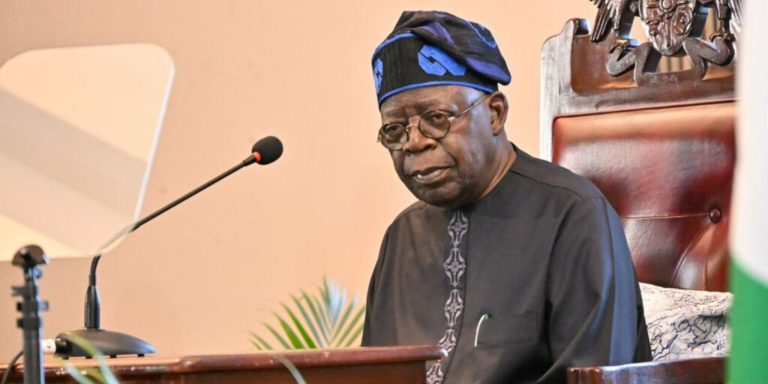President Bola Ahmed Tinubu has pledged to accelerate Nigeria’s development by prioritising food security and technology-driven growth, drawing inspiration from Brazil’s economic transformation model.
Speaking during a Tuesday evening meeting with Nigerians in the Diaspora in Brazil, Tinubu reaffirmed his administration’s commitment to reform, innovation, and inclusive growth.
“We must bring Nigeria to the forefront of Africa’s progress, driven by technology, food sovereignty, and the courage to change our destiny,” he said.
The President described his state visit to Brazil as a strategic move to strengthen bilateral ties and learn from the South American country’s remarkable progress in agriculture, technology, and manufacturing.
“Once upon a time, Nigeria and Brazil stood on the same level. Look at Brazil today—its technology, its food systems. We must ask ourselves: what do they have that we don’t? We have the brains, the energy, and the youth. Now, we must act,” Tinubu added.
Tinubu praised the Nigerian Diaspora community in Brazil, describing them as essential stakeholders in nation-building.
“You are the pride of our nation. Your diversity, your commitment—it reflects the Nigeria we are working to build. I salute you all,” he said.
While acknowledging the hardship caused by ongoing economic reforms, the President likened them to “bitter medicine” necessary for long-term stability and prosperity.
He also referenced his administration’s diplomatic efforts to build partnerships that can unlock Nigeria’s potential in manufacturing, technology, and cultural exchange.
“We can manufacture, we can design, we can build a nation that works—purposefully and prosperously—for all of us,” he declared.
Tinubu further expressed support for a cultural voyage involving Nobel Laureate Wole Soyinka, inspired by an initiative he introduced as Lagos State governor.
Earlier, Mr. Chika Emmanuel, President of the Nigerian Diaspora Organisation (NIDO) in Brazil, commended Tinubu’s leadership and pledged continued support for national development.
“We have stopped complaining and chosen to work,” Emmanuel said. “Before my election, we had only three PhD students here. Today, we have 296 PhD students in Brazil, all on scholarships.”
He highlighted ongoing Diaspora efforts to channel investments into agriculture, technology, and infrastructure back home.
Speaker of the House of Representatives, Tajudeen Abbas, described the meeting as a “moment of historical significance,” noting Nigeria and Brazil’s deep-rooted ties forged through migration and cultural exchange. He commended Tinubu’s efforts in rekindling those bonds and announced that direct flights from Lagos to São Paulo are set to boost trade and cultural exchange, with the potential establishment of a Nigerian consulate in the city.
Governor Uba Sani of Kaduna State, who represented governors on the President’s delegation, lauded Tinubu’s economic reforms, particularly the clearance of a $7 billion forex backlog.
“Before now, even Nigerians struggled to invest freely. But today, any investor can come in, do business, and take their profits without unnecessary hurdles,” he said, crediting reforms such as the elimination of multiple exchange rates.
Minister of State for Foreign Affairs, Bianca Odumegwu-Ojukwu, encouraged Nigerians in São Paulo and nearby areas to continue engaging the existing liaison office until further upgrades are provided.
The meeting was anchored by Abike Dabiri-Erewa, CEO of the Nigerians in Diaspora Commission (NiDCOM), and attended by top officials including Deputy Senate President Barau Jibrin, Plateau State Governor Caleb Mutfwang, Ministers Mohammed Idris (Information), Jumoke Oduwole (Trade), Hannatu Musawa (Arts and Culture), as well as Nigerian students, diplomats, and cultural ambassadors in Brazil.


